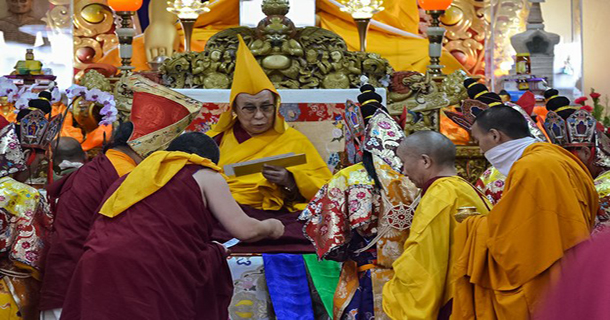Tibetans and supporters all over the world gathered this month to pray for a quick recovery for His Holiness the Dalai Lama who has been having treatment at a clinic in Minnesota in the United States of America.
Inside Tibet, despite heavy restrictions and security clampdowns, people have been conducting prayer services. The monks of Gaden Shedrup Thupten Phegyal Ling Monastery in Kharnang town, Tridu County, in Kham led scores of people in a weeklong-chanting ritual of over million mantras and a mass prayer. On February 23, the 16th day of the Tibetan New Year, they carried a portrait of the Dalai Lama, the 10th Panchen Lama and the founder of the monastery, Jamyang Tenpe Nyima during “the invitation to Maitreya” ceremony, vowing to perform rites to aid his recovery as well as virtuous deeds Lobsang, a Tibetan from the region now living in exile told Voice of Tibet.
Many others prayed secretly in the privacy of their homes to get around the Chinese authorities’ restrictions imposed to prevent public prayer sessions.
As well as praying in their homes, Tibetans in Ngaba town in the Sichuan province, and Mangra county in Qinghai province, have been praying in for the good health of His Holiness by exchanging prayers and recitations over the Chinese mobile text and voice messaging communication service WeChat. Radio Free Asia’s (RFA) Tibetan Service reported an unnamed source from the area as saying that the local Tibetans were aware of His Holiness’s trip for medical treatment despite the fact that Chinese authorities had cut off internet service in Ngaba region for some time.
“They were worried and wanted to conduct a large prayer service for his speedy recovery, but because of Chinese restrictions, it is difficult to form a large prayer congregation,” said RFA’s source, who declined to be named. “So many individuals have been praying in the privacy of their homes.”
Chinese officials were keeping a close eye on people in Mangra county and paying frequent visit to Tibetan monasteries there to watch activities. RFA quoted a Tibetan in exile, who is a native of Mangra, as saying that this was making it very difficult for the monks and others in monasteries and villages to hold prayer services for His Holiness.





 Print
Print Email
Email